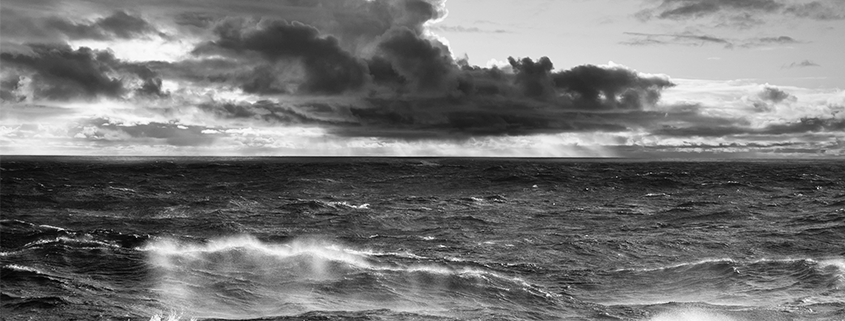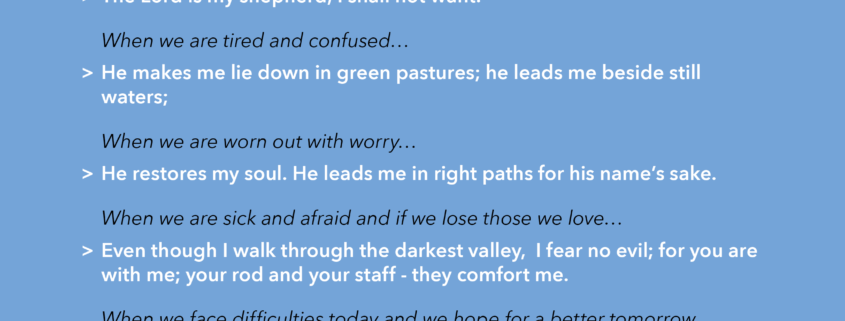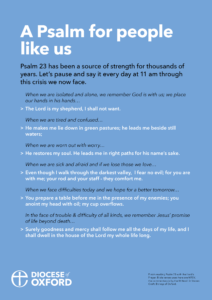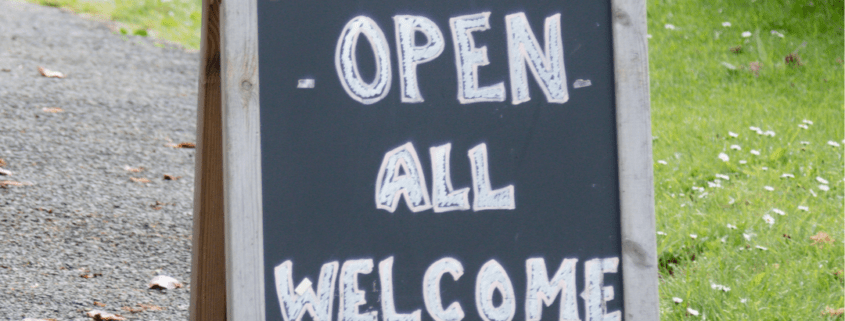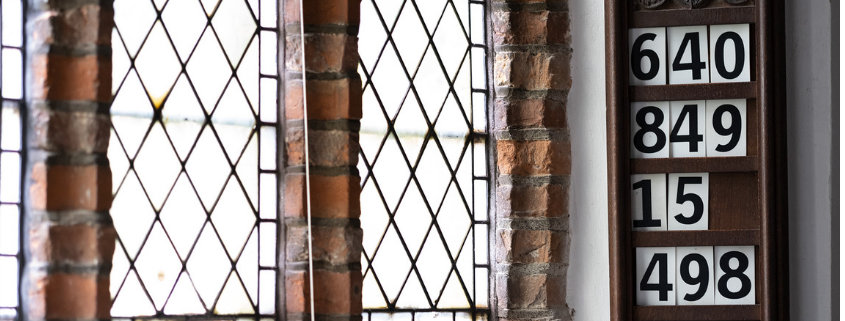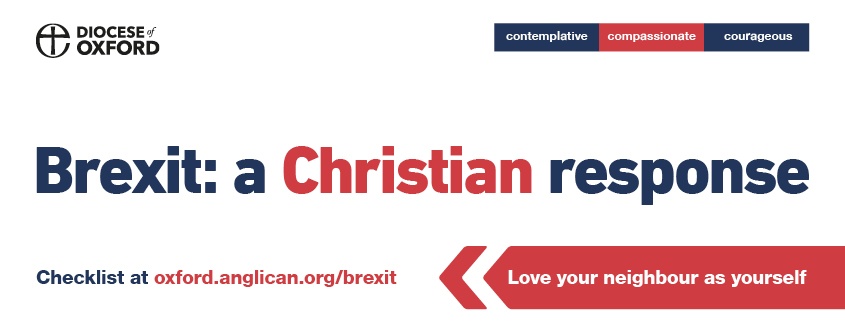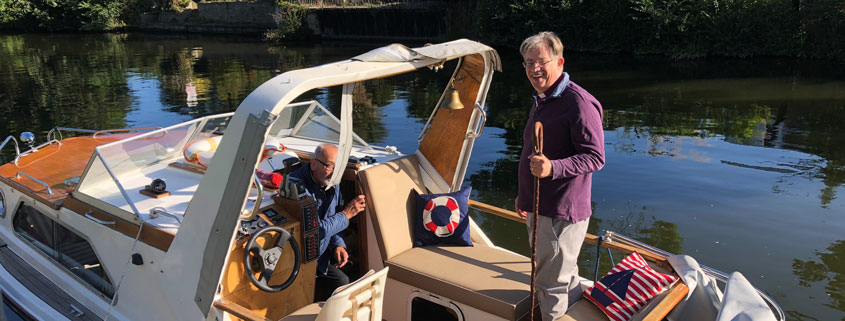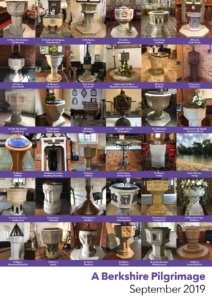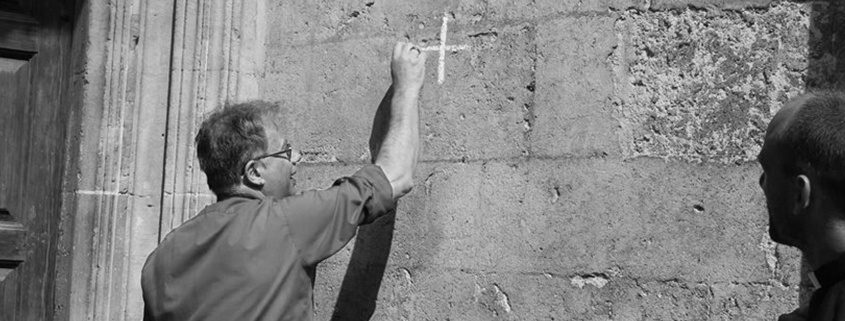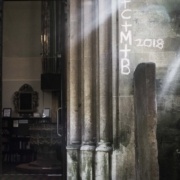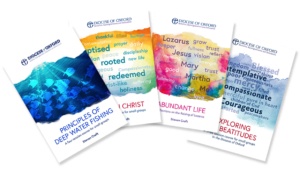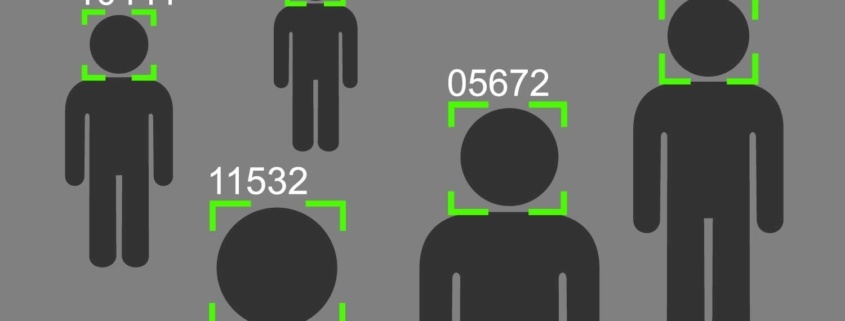The stilling of the storm
Seven days ago, Pope Francis began his address to the city of Rome and the world with these words:
“Like the disciples in the Gospel we were caught off guard by an unexpected, turbulent storm. We have realised that we are on the same boat, all of us fragile and disoriented, but at the same time important and needed, all of us called to row together, each of us in need of comforting the other. On this boat… are all of us. Just like those disciples, who spoke anxiously with one voice, saying “We are perishing” (v. 38), so we too have realized that we cannot go on thinking of ourselves, but only together can we do this”.*
We have absorbed the first shock of the pandemic. We are learning to work in new ways and to work together across Church and society. We gather ourselves for the next wave. We hold together and support each other in the grace of Jesus Christ.
Thank you again for all you are being and doing. It is deeply appreciated in both church and wider community. The creativity, love and compassion evident in the Diocese are like shafts of light piercing the darkness.
Holy Week and Easter
Holy Week and Easter this year will be like no other we have experienced. Many local churches are offering prayers and meditations. Thank you. Many others can’t do this or prefer to focus their energies elsewhere and to join in the streamed worship offered by the Diocese. Don’t subject yourself to unnecessary guilt.
We are now making plans to offer live streamed worship for the Diocese on Sundays and Holy Days in the coming months to complement what is offered locally. We want this Diocesan prayer and worship to be sustainable over the long haul, collaborative, creative, accessible to all traditions, reliable and prioritising not competing with the local.
Our principal Diocesan services will be at 10 am each Sunday as last week. Wherever possible this will be live with some pre-recorded elements. The full list of services and times for Holy Week and Easter is as follows:
Palm Sunday 10 am A Diocesan Eucharist with Bishop Olivia presiding
This will introduce Holy Week and point forward to a nationally provided and recorded dramatised Passion reading.
Maundy Thursday 11 am
The Renewal of Vows for Licensed and Ordained Ministry
Please would all licensed and ordained ministers gather for this Service of the Word with the traditional renewal of vows. Please retain your oils from last year as it will not be possible to bless or distribute new ones. I hope that Deanery Chapters or smaller groups might gather virtually before or after the service to give something of a sense of the fellowship we enjoy together.
Maundy Thursday 8.15 pm
A Diocesan Eucharist with Bishop Colin presiding
For Good Friday we will offer a series of six short addresses from myself, each with hymns and prayers as podcasts. These will be available from noon on Maundy Thursday to listen to on the website or download as a podcast. You may want to listen to them and keep the traditional three hours; or space them out across a whole day set aside for prayer; or use from Maundy Thursday to Holy Saturday; or just use the final two as you keep watch at the cross.
Easter Day at 10 am
A Diocesan Eucharist and I will preside and reflect.
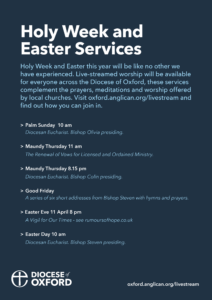 These services are all advertised in this flyer (colour version or mono low ink version. Please do make them known to as many people as possible if you are not promoting your own services.
These services are all advertised in this flyer (colour version or mono low ink version. Please do make them known to as many people as possible if you are not promoting your own services.
Again and again I have brought to mind in recent weeks the verse from the temptation stories: we do not live by bread alone. At this time more than at any time we need to offer spiritual resources for the challenges we face.
I am very grateful to the team of liturgists and communications staff who are working hard to make all this possible. There may well be hitches and glitches. Bear with us.
The Church of England app (currently #LiveLent) will carry my own reflections on the Lord’s Prayer with new introductions in this time of pandemic for the forty days of Easter beginning on Easter Day.
Funeral Services
I am very concerned to hear that some of you are being placed in an unacceptable situation at a crematorium or graveside funeral, with scores of mourners arriving and fully expecting to attend the service. At this time of crisis we, more than ever, wish to offer the ministry of the church to those that we have been called to serve but this must be done safely.
The present Government guidance says that numbers at funerals should be restricted and a safe distance preserved.
The Church of England guidance is aligned to that of the Government and unpacks the meaning of ‘close family’,
Because of the present public health regulations, the only available options for Church of England funerals are the following:
• a short service at the crematorium, with or without a very small congregation, which may only include spouse/partner, parents, and children of the deceased;
• a short service at the graveside, under the same conditions.
This guidance is clearly not being enforced by many of the crematoria or cemeteries in this Diocese and we have heard similar accounts from across the country. We have been in touch with the national church about this and they have petitioned the Government. We have also drawn it to the attention of the statutory authorities across the Thames Valley.
There is no easy solution to the problem of too many people turning up at a funeral. I hope that a stronger lead will come from Government soon. In the meantime, I offer this best practice guidance:
- explain clearly to family in advance the rules about numbers and state that they must be strictly kept to; ask them to name for you the people who will be attending; ask them to explain to wider family and friends that they cannot unfortunately attend; explain option of a memorial service later in the year when this is over
- speak in advance with the funeral director and the crem/council staff to check that they are committed with you to following the Government guidance; have a shared plan for how to respond if larger than expected numbers arrive.
- If at the service larger numbers arrive, explain to everyone that only immediate family (spouse/partner, parents, and children of the deceased) can remain and look to the undertakers and crematorium staff to support you in this. Please do not place yourself unduly at risk.
I will also be writing a letter to all funeral directors, crematoria and council cemeteries seeking their support in this.
It is likely that, tragically, the number of deaths will continue to rise over the next few weeks and so, therefore, will the number of funerals in the remainder of April and May.
Please pace yourself through this period as best you can. Funeral ministry is demanding, particularly in a time of national tragedy. Take regular days off. Take time to de-stress after a funeral. Talk to colleagues and to friends. Don’t feel you have to accept every request beyond what is sustainable.
We are working at the moment to provide some central administrative support for clergy and undertakers to support what may be a surge in this ministry and will write with more information when that is in place. In common with the majority of dioceses, we will not be charging funeral fees for services at crematoria during this period starting immediately.
The Church of England has recently published a useful checklist on mental health for clergy and lay ministers.
Visiting the sick
One of the hardest features of the pandemic will be that we cannot and must not visit those who are sick in person. Our visits will have to be remote, but all of us can express warmth and companionship and pray for healing through phone and text and by other digital means. Those who are passing through the valley of the shadow of death need to know that God is with them and that we are continually praying for them and walking with them, albeit from a necessary distance.
Finance
Finance will not, I hope, be uppermost in our minds in the coming days. However, there is considerable anxiety already among PCC and Deanery Treasurers about the effect of the epidemic on fees, cash giving, lettings income and fundraising, and you will be aware of this.
Our Diocesan finance teams are working hard on this and we will communicate more in the weeks after Easter.
“He made the storm be still”
In Psalm 107 we read:
“He made the storm be still and the waves of the sea were calmed”
There are storms around us and there will be storms within us, of grief and fear, of questions. Christ is with us in the boat as it rises and falls with the waves. Christ is able to speak peace to the storm within and without.
It may well be that the initial shock and working together and community we see at present will fracture as the pandemic advances. We will need all of our patience and hope and resilience if that is so as we have to deal with anger and hurt and fear of all kinds.
Please watch over yourself in this and draw on the deep wells of the faith. Neither the Archbishops nor your own Bishops will get everything right through this crisis. Nor will any of us. We offer what we can, consecrating ourselves to God each day, in humility and in love and seeking to serve and give glory to God and to others.
In all of these ways, we are called to walk the way of the cross and to discover that it will also become the way of resurrection and of Easter hope.
Dear friends keep well; watch and pray and love. I look forward to our being together, if only virtually, on Maundy Thursday.
With our love and prayers,
+Steven, 3 April 2020
on behalf of the Area Bishops and Dean

